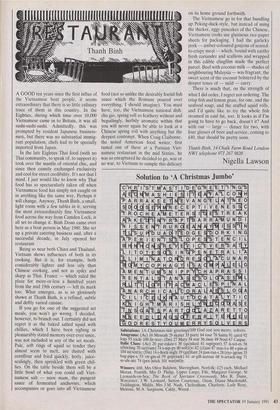A GOOD ten years since the first influx of the
Vietnamese boat people, it seems extraordinary that there is so little culinary trace of them in this country. In the Eighties, during which time over 10,000 Vietnamese came in to Britain, it was all sushi-sushi-sushi. Admittedly, this was prompted by resident Japanese business- men, but there was no substantial immig- rant population; chefs had to be specially imported from Japan.
In the late Eighties Thai food (with no Thai community, to speak of, to support it) took over the mantle of oriental chic, and since then cannily exchanged exclusivity and cool for street credibility. It's not that I mind. I just would like to know why Thai food has so spectacularly taken off when Vietnamese food has simply not caught on in anything like the same way. Perhaps it will change. Anyway, Thanh Binh, a small, light room with a few tables in it, serving the most extraordinarily fine Vietnamese food across the way from Camden Lock, is all set to change it. Binh Doan came over here as a boat person in May 1980. She set up a private catering business and, after a successful decade, in July opened her restaurant.
Being so near both China and Thailand, Vietnam shows influences of both in its cooking. But it is, for example, both considerably lighter and less oily than Chinese cooking, and not as spiky and sharp as Thai. France — which ruled the place for more-or-less a hundred years from the mid 19th century — left its mark too. What emerges, as is so gloriously shown at Thanh Binh, is a refined, subtle and deftly varied cuisine.
If you go for one of the suggested set meals, you won't go wrong. I decided, however, to branch out. I certainly did not regret it as the baked salted squid with chillies, which I have been sighing in pleasurably stated memory over ever since, was not included in any of the set meals. Pale, soft rings of squid so tender they almost seem to melt, are dusted with cornflour and fried quickly, hotly, juice- sealingly, , then sprinkled with green chil- lies. On the table beside them will be a little bowl of what you could call Viet- namese salt — nuoc mam, the pungent sauce of fermented anchovies, which accompanies or goes into all Vietnamese
food (not so unlike the desirably foetid fish sauce which the Romans poured over everything, I should imagine). You must have, too, the Vietnamese national dish, cha gio, spring roll so feathery without and beguilingly, herbily aromatic within that you will never again be able to look at a Chinese spring roll with anything but the deepest contempt. When Craig Claiborne, the noted American food writer, first tasted one of these at a Parisian Viet- namese restaurant in the mid Sixties, he was so enraptured he decided to go, war or no war, to Vietnam to sample this delicacy
on its home ground forthwith.
The Vietnamese go in for that bundling up Peking-duck-style, but instead of using the thicker, eggy pancakes of the Chinese, Vietnamese cooks use glutinous rice-paper sheets for packaging. I had the garlicky pork — amber-coloured goujons of seared- to-crispy meat — which, bound with earthy fresh coriander and scallions and wrapped in this edible clingfilm made the perfect parcel. Beef with coconut milk — shades of neighbouring Malaysia — was fragrant, the sweet scent of the coconut bolstered by the deeper tones of — mild — curry.
There is much that, on the strength of what I did order, I regret not ordering. The crisp fish and lemon grass, for one, and the seafood soup, and the stuffed squid rolls, and I'd quite like to try the whole fish steamed in caul fat, too. It looks as if I'm going to have to go back, doesn't it? And with our — large — dinner for two, with four glasses of beer and service, coming to £40, that should be pretty soon.
Thanh Binh, 14 Chalk Farm Road London NWI telephone 071 267 9820
Nigella Lawson


















































 Previous page
Previous page